"I can't go to the pool I don't want to get my hair wet". I'm sure at some point or another you have said or heard this phrase. No this isn't stated because people hate getting their hair soaked or that dealing with damp hair is uncomfortable. People say this because chlorine is such a harsh chemical that can destroy the healthiness of anyone's hair.
I have been a lifeguard for three years now and I still currently work at a pool providing swim lessons to kids and adults. It wasn't long before my hair started breaking off, losing its sheen, and becoming unmanageable. If I was going to be working this job that I love so much, I thought it would be best to do some research on how to keep my hair healthy and protected before and after I leave the swimming pool.
So, I'm here to give you some tips on how to protect your hair before and after getting in that water. Let's dive on in!

What is Chlorine and How Is It Dangerous?
With all this talk on how chlorine damages your hair, I thought we should first discuss exactly what chlorine is. Chlorine is a chemical that is placed in pool water to kill off any germs or bacteria that may be floating around.
Chlorine is in many other places, for example, it is in medicine, in products like paper or plastic, and even used to sterilize most drinking water. Does this sound like a chemical you would want floating around on your hair and skin? I think not.
If you are regularly in contact with chlorine there are several things that it can do to your hair:
- Hair can get discolored
- Damage hair follicles
- Dry, itchy scalp
- Brittle prone to breakage frizzy hair lack of Sheen
- Dandruff
The list goes on and on.
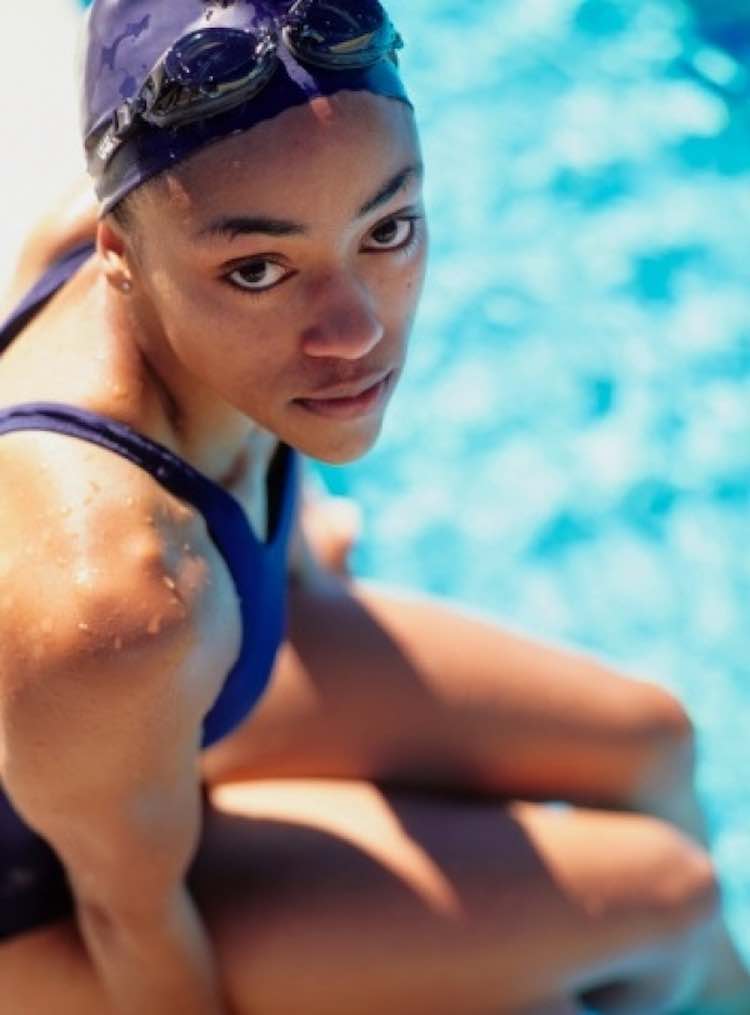
The Danger of Chlorine On Hair
If you are an avid swimmer, you are bound to come into contact with chlorine on your hair. If hair absorbs too much chlorine into the follicles, it can dry out the scalp. This can leave your hair depleted, brittle, and prone to breakage.
Some of you may not know, but our hair is made up of several layers; the most important segments are the cuticle and the cortex.
The core of our hair strand is the cortex; the outer layer which is the epidermis protects the cortex. The cuticle is the shiny, smooth part of the hair, and it is kept polished and soft by a layer of sebum that is produced by our scalps. The chlorine found in pools can strip away the sebum that is coming from our scalps, and this is what causes our hair to dry out, lose shine, and leads to breakage and split ends.
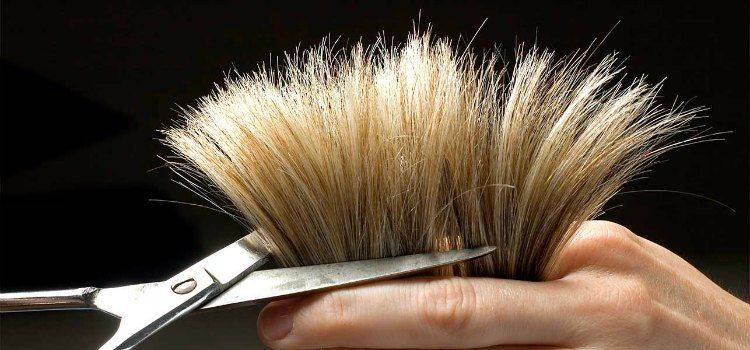
Tips To Protect Your Hair Before You Swim
Protecting your hair before you swim is just as important as after. Let's go over some tips to protect your hair before you swim.
Use an Outdoor Pool
I know that we all enjoy the comfort of going to an indoor pool, especially when it's cold outside. Indoor pools are heated, convenient, and come with plenty of other amenities. But for those days where the weather is just right, try swimming in an outdoor pool.
Pools outside allow chemicals like chlorine that is in the water to escape in the air, and this leaves less of the chlorine contaminate on your hair and skin. In fact, these pools are better for your eyes, sinuses, and respiratory health if you are a long-time swimmer. If you need to swim in an indoor pool, you should look for a well-ventilated one to help chlorine gases escape.

Coconut Oil Is Your Best Friend
Coconut oil or olive oil are great and useful products that can help protect your hair from chlorine. If you rub coconut or olive oil on your scalp, it helps naturally produce sebum, which will keep your hair strands shiny and healthy. These oils help bring moisture back to the hair; they also have vitamins A, E, and antioxidants filled in them.
Coconut oil also helps protect the keratin in our hair making it easier to seal in moisture. So even if your hair happens to get in contact with chlorine water your hair strands already have a safe coat of olive or coconut oil on them. So hurry, and head to your nearest beauty supply store and rack up on this product!

Use Leave In Conditioner
Just like olive oil, leave-in conditioner (Check out this article: best leave in conditioner) provides a protective layer over your hair. It helps reduce split ends, detangle hair strands, and keeps our hair's natural curl pattern soft, smooth, and intact.
Unlike most conditioners that you use while in the shower, these leave-in products are used after you wash your hair and then rinsed out during your next wash day. Since the leave-in conditioner adds an extra dash of moisture to your hair, the chlorine will have a difficult time drying out and getting into your hair follicles. There are also special leave-in conditioners used explicitly for swimming.
The best thing is that all leave-in conditioners can be rinsed out after leaving the pool. This will keep your hair in excellent and healthy condition.

Swim Cap
Wearing a swim cap is probably the best alternatives if you do not like using a lot of hair care products. These caps are inexpensive and come in all different shapes and sizes.
Swim caps reduce the load of water that encounters your hair and lessen the amount of hair that can come in contact with your face while swimming. They're also reusable and since your scalp won't be exposed to the chlorine as much in this, it will help your hair maintain it's health.
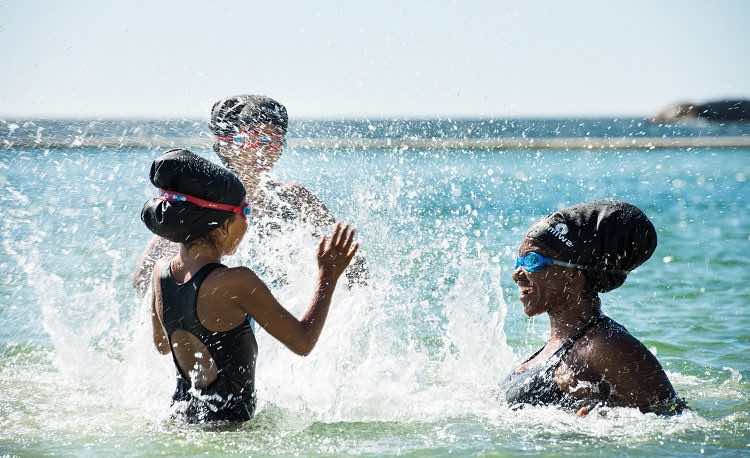
Wet Your Hair Before Swimming
This may sound redundant, but wetting your hair before you enter the pool can be a great precaution and very helpful for keeping your hair healthy from chlorinated water. Wetting hair is probably the best technique for swimmers who wear their natural hair out.
Having your hair wet before you come in the pool decreases the chance of chlorinated water entering your scalp, and being absorbed into the hair follicles. You can also use this technique on your skin, for this reason, it is a must that you take a good shower and thoroughly soak your skin and hair before you enter the pool for a swim.
Put Your Hair Up In One
The way you wear your hair to the pool can help keep it healthy and protected. If you're going to the pool for just a little vacation or light swim, maybe even exercise, try to keep your head and hair out of the water as much as possible.
I'm a part-time swim instructor, and yet I don't fully submerge my hair in the water unless it's necessary. Putting your hair up in one will reduce the amount of chlorine that your hair will absorb. So if you plan on going to an indoor or outdoor pool try finding some cute updo hairstyles that are sure to leave your hair looking flawless and out of the chlorinated water harms way.
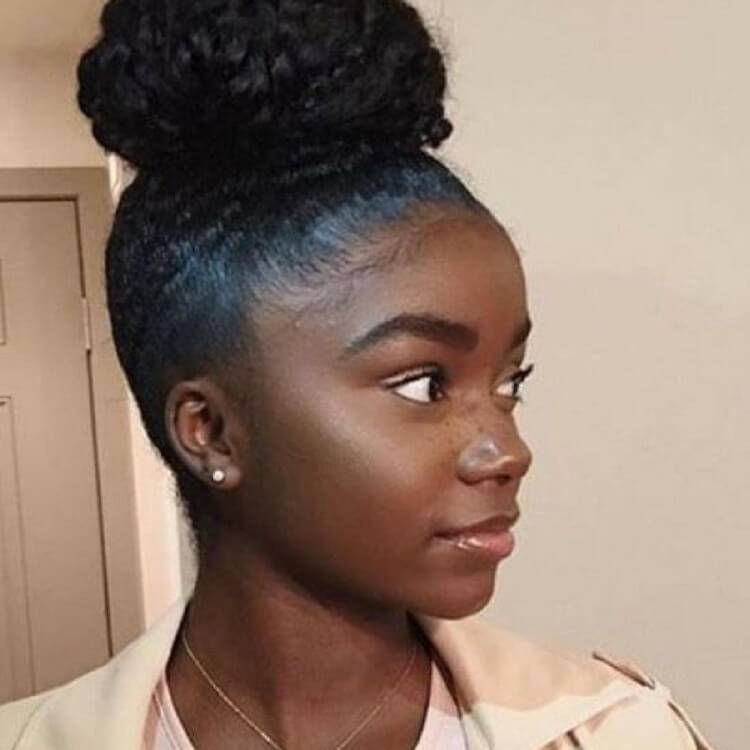
How To Protect Your Hair After Swimming
What you do to your hair before swimming is just as important as what you do after. Let's go over a few steps you can take to protect your hair after swimming.
Wash Hair After Swimming
It is critical to wash the excess chlorine out of your hair after leaving the pool. You do not want to wait too long after swimming to act, or this will leave you with dull and dry hair. Make sure to rinse hair with cold water. This will help seal the hair cuticle, and all of the chlorine is appropriately washed out.
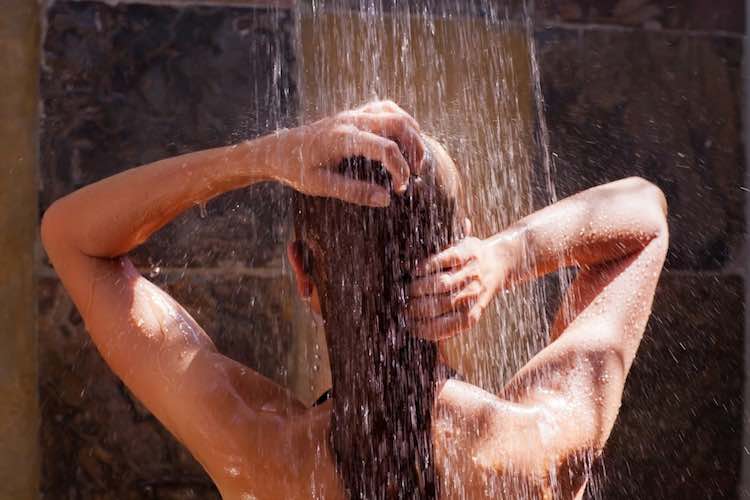
Rinse Hair With Apple Cider Vinegar
Apple cider vinegar is an excellent treatment for natural hair and chlorine absorbed hair. It is great for growth and gives the hair more body and shine. It also helps reduce itchiness on the scalp and prevents bacteria from blocking up your hair cuticles.
Now if this isn't motivation enough, apple cider vinegar can minimize hair loss. These are all great things for an active swimmer. There have been plenty of great reviews on the positive effects of using apple cider vinegar on hair. Make sure to do plenty of research if you think this may be an alternative that you'd like to try.
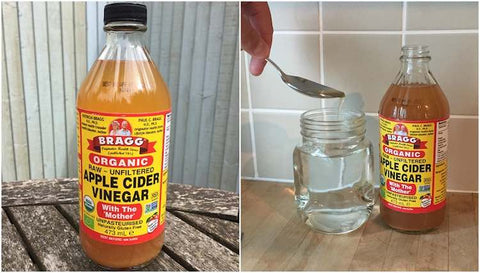
Towel Pat Dry Hair
Try to avoid blow-drying your hair; this will only add breakage and damage to your hair follicles. As we know heat dries out hair and so does chlorine. The combination of both will leave a horrible result on your hair.
Instead, try wringing your hair out in the shower and towel dry the remaining water on hair. Afterward, let your hair air dry for maximum control over heat damage.

Detangle Hair
Detangling your golden locks is very important. Wet hair is the easiest to knot up. If you detangle your mane the right way you, can help prevent thinning and breakage.
You want to make sure you use a wide-tooth comb. Regular combs have teeth that are tiny, and close together which makes combing through wet hair very dangerous. Regular combs will pull and tug on the simplest of hair knots. Instead, a wide-tooth comb will minimize ripping the hair from your scalp. The best way to detangle hair is to hold it in your hands midway. Next, comb from the bottom of your hair and work your way up and toward the top of your head.
Just because you're not swimming doesn't mean your hair doesn't need to be treated. Keep hair untangled even before bed. Try braiding your hair right before you sleep. Braiding your hair will help your hair be less tangled when it's time for you to go for a swim.

Wear Protective Hairstyles
Wearing a protective hairstyle can eliminate nearly 70 percent of the chlorine that comes in contact with your hair before and after swimming.
From box braids, Bantu knots, even slicked up buns, having an excellent protective hairstyle can be beneficial to your natural hair. Research and pick which look suits you best! These hairstyles will help reduce the amount of chlorine absorbed into the scalp and prevent tangling.

Buy Swim Spray
Swim spray has been my best friend ever since I became a lifeguard. Whenever I would leave the pool, I would notice dry patches of skin peeling on certain parts of my body including my hair. What most people don't know is that even after you leave the pool and wash yourself off in the shower, chlorine remains and can eat away at your skin and hair for 3 to 5 days until it's completely gone.
Dr. Andre Chadeayne is a keen swimmer who was extremely annoyed by how chlorine would remain on his skin and hair after he would get out of the pool. He used some of his expertise in chemistry to come up with a product to help remove chlorine from the hair and skin.
Swim spray has vitamin C in it, and this is used to neutralize the bonds chlorine may have on our body once we step foot out of the pool. In turn, this removes chlorine from your hair and skin.
90 percent of users including myself have been flabbergasted by how well this product works. It can completely remove up to 100 percent of the chlorine water on our skin and hair. What's also great about this product is that it is made up of all-natural ingredients, this makes it safe for even children to use.
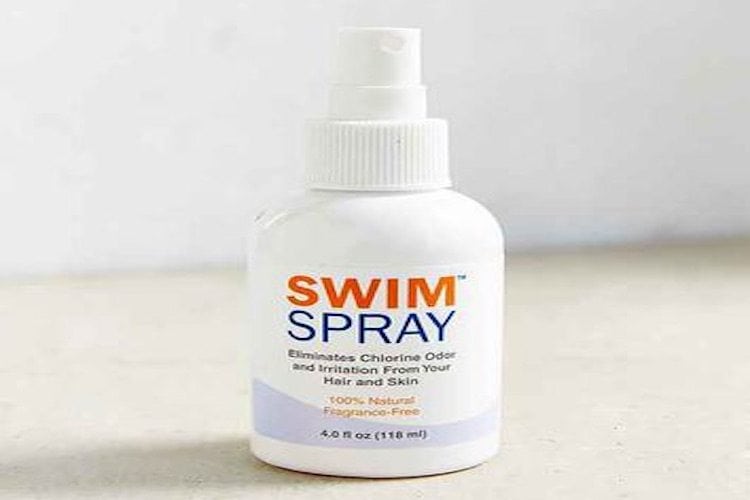
Give It A Try!
After reading over these tips, I hope that you are not as scared to enter a pool and get your hair wet as you may have been before. Swimming can be a fantastic exercise, and a great way to relieve some stress. You don't want to stop doing something you love just because keeping up with your hair is a little tedious.
These tips are simple and only take a short time out of your hair regimen when entering or leaving a swimming pool. A few extra minutes can make all the difference between damaged or beautiful and healthy hair. Don't be lazy it's all worth it in the end.
If you have some tips for keeping hair protected from the chlorine that is not on this list, feel free to comment and give us some of your feedback. Also, let us know if you plan on trying any of these tips in the future.
Don't desert the pool to keep your hair intact, just apply these few tricks, and I promise you will forever enjoy those long summer nights in the pool.

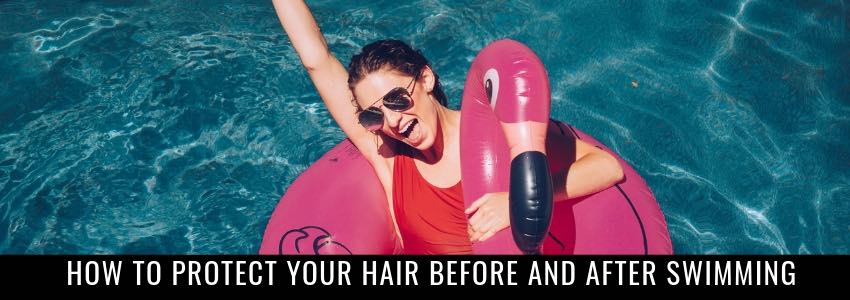
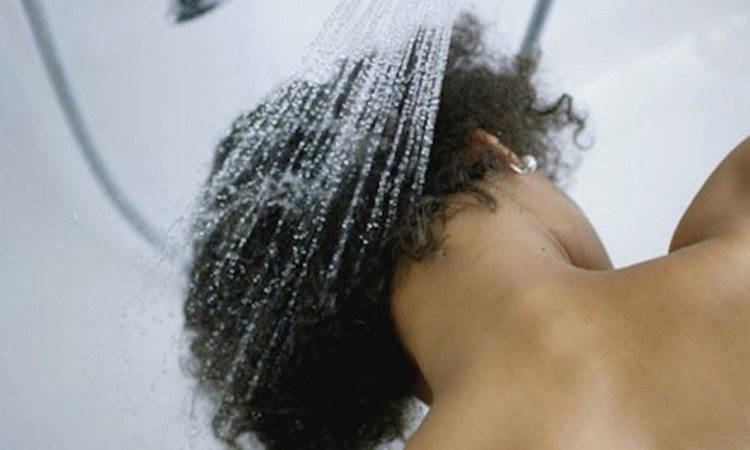

1 comment
All the info I needed , thanks so much <3